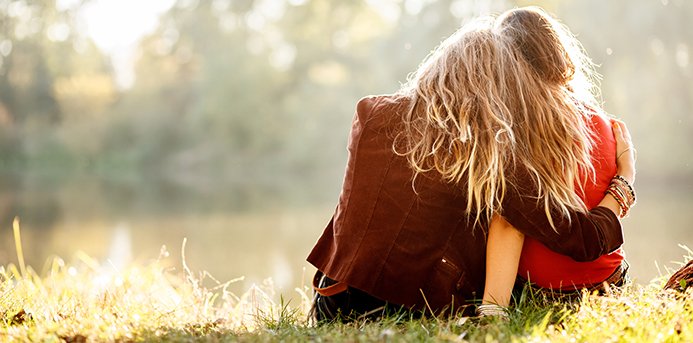In the throes of COVID-19, the simple question, “How are you?” has more weight, meaning and consequence than it did just a few months ago.
Social media feeds are filled with questions like, “How’s everybody doing?” And the answers are rarely upbeat.
At least 316 million Americans are staying home, many are working remotely. Millions are missing once in a lifetime experiences like weddings, trips and graduations.
My daughter is a senior in high school and her cohort bears the unique mantel of coming into the world during 9/11 and having their launch into adulthood complicated by COVID-19.
More than 10,000 babies a day are born in the United States. Everything about childbirth and being a new parent is upended — from who can be with you for the birth, to hospital fear, to accessing supplies for the newborn.
In ordinary times, the U.S has 6,500 funerals a day. Not only has the death toll risen dramatically, important rituals honoring loved ones are delayed, adjusted or cancelled.
More than 36 million people live alone in the United States and many have had no physical contact for weeks.
With the call for social distancing extended through the early summer or longer, the practice may lead to loss of connection, resulting in isolation and depression. Many need strategies to move past the conditioned response of, “I’m fine.”
A conditioned response is a learned response to a stimulus that was previously neutral. The most famous example many remember from science courses is Pavlov’s Dogs. Ivan Pavlov was a Russian physiologist whose research showed that dogs would learn to salivate when they heard previously neutral sounds that were later associated with feeding, like the opening of a certain door.

Similarly, the response “I’m fine” has become an equally unconscious response, an automatic retort to a question we are asked multiple times that fails to give deeper, more authentic information.
This has never been ideal in creating deeper relationships, but in the time of COVID-19 moving beyond rote responses is critical to protect mental health.
According to the Mental Health Association, 10.3 million adults had serious thoughts of suicide in 2017 – a number that was already rising year over year.
There is powerful evidence that increased social isolation will lead to this number growing at a much faster rate. Dr. Julianne Holt-Lunstad co-authored a meta-analysis which found that lack of social connection heightens health risks as much as smoking 15 cigarettes a day or abusing alcohol.
Working in mental health for over 20 years, I see this reality over and over again. I was consistently most worried about someone’s prognosis when he or she felt invisible or lacked social tethers.
There is no true barometer—individual or collective—for how people are doing, as the magnitude of what the world is facing far outpaces what we have seen in this century.
What is certain is that the automatic response, “I’m fine,” is likely untrue. Adjusting one’s relationship to his or her mental health and making sense of the nonsensical is part of everyone’s job description in 2020.
Here are strategies to open space so people might share more about how they are doing or what they need.
Ask. And ask again.
The first hurdle of simply asking must be cleared. This takes more thought and effort when under a stay-at-home order, but making the time to check-in with a text or phone call and asking questions from a posture of genuine curiosity can be a relief people didn’t even know they needed. In addition, people like engaging around sincere questions. A 2017 Harvard study explored the connection between questions and likability and found that people who ask questions are more liked by their conversation partner.
Model vulnerability.
University of Texas–Austin Professor and best-selling author, Brené Brown, re-invigorated interest in the power of vulnerability with her TED talk, the fourth most-popular of all time with over 47 million views. She recently shared four specific tips for navigating anxiety during the coronavirus. First, understand the toll anxiety takes; move your body; don’t rank your suffering and lastly, acknowledge it’s ok to be vulnerable. Brown describes vulnerability as the greatest measure of courage and as the capacity to show up and tell the truth about one’s story. Now could very well be a you-go-first moment. If you want to know what’s behind, “I’m fine” for someone else, think about what’s behind it for you and be willing to share.
Seek feedback on what is working.
Very often people are more comfortable contributing a solution than sharing their discomfort or despair. Asking someone what is helping them navigate these times can act as a side door if the front door feels jammed. When people share specifics of how they are coping, a next thoughtful question, like, “How did you know you needed to prioritize that?” can free someone to talk openly about what has been hard. This strategy of focusing on solutions can also underscore a sense of agency—a feeling of control over actions and their consequences–even in the toughest conditions. It can be a reminder of what first century philosopher Epictetus said, “It’s not what happens to you, but how you react to it that matters.”
Between health challenges, economic challenges and the loss of normalcy, many will need more support. Now’s a time to look out for each other and part of that is recognizing SOS signals and employing strategies that will invite others to share more than a typical “I’m fine.”
How to Help:
For organizations to support and resources to help you and others through this difficult time, check out our Better List.
More from Better:
- Dating While Social Distancing: Why COVID-19 Isn’t Stopping Those Looking For Love
- Take a Break from Screens with These Stress-Relieving Activities
- Facing Our Feelings: Three Women Share How They Are Coping During Coronavirus
 Michelle Kinder is co-author of WHOLE: What Teachers Need to Help Students Thrive, Director of the Social Change Leadership Program at Stagen Leadership Academy, a Licensed Professional Counselor and a Public Voices Fellow through The OpEd Project.
Michelle Kinder is co-author of WHOLE: What Teachers Need to Help Students Thrive, Director of the Social Change Leadership Program at Stagen Leadership Academy, a Licensed Professional Counselor and a Public Voices Fellow through The OpEd Project.

